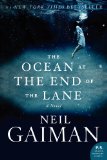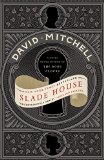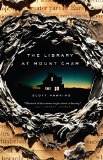Summary | Excerpt | Reading Guide | Reviews | Beyond the book | Read-Alikes | Genres & Themes | Author Bio

Critics' Opinion:
Readers' Opinion:
First Published:
Jun 2013, 192 pages
Paperback:
Jun 2014, 192 pages
 Book Reviewed by:
Book Reviewed by:
Cindy Anderson
Buy This Book
The Ocean at the End of the Lane is an evocative, and deeply affecting story-within-a-story. A blend of fantasy and reality, it is about a man who returns to his hometown, visits a place he had forgotten existed, and there, recalls his lost memories of a time when he was seven. The volume may seem a bit slim, but do not let appearances fool you. Gaiman's novel is multi-layered and rich with meaning, and the many themes suggested by the narrative will inspire some good conversations.
The prologue and epilogue, set in the English countryside in the present day, frame the main part of the narrative. The first-person narrator is a divorced artist in his late 40s who, as the prologue opens, has returned to his childhood hometown to speak at a funeral. Having some time on his hands, he drives to the site of his old house. When he decides to follow the lane to the end, it begins to show physical changes:
"The slick black road became narrower, windier, became the single-lane track I remembered from my childhood, became pack earth and knobbly, bone-like flints. Soon I was driving, slowly, bumpily, down a narrow lane with brambles and briar roses on each side."
These changes mark that the man is moving from modern to primitive, present to past, mundane world to fairy tale. At the end of the lane the man recognizes a farmhouse that once belonged to the Hempstocks. He remembers that Lettie Hempstock was a childhood friend. As he sits by a pond that Lettie used to love, he tries to remember the name she had for it. Finally, it comes to him:
"Lettie Hempstock's ocean.
I remembered that, and, remembering that, I remembered everything.
This pivotal moment of remembrance ends the prologue and sets up the first chapter, which brings us into the story of the boy who the man once was.
The prologue's relatively bland atmosphere and slow, even pacing, compared with the exciting events in the next several chapters, reminded me of the first 30 minutes or so of the Wizard of Oz , which was filmed in black and white/sepia tones to create a stark contrast between the mundane world of the farm, and the colorful, magical land of Oz (filmed in technicolor). Gaiman's framing story has a similar effect. The man's tone in the prologue is matter-of-fact and neutral. It is very real and somewhat melancholy compared to the tension and accelerated pace of the upcoming chapters.
The boy lives with his parents and little sister at the top of the country lane. He is timid but clever, preferring books to people. One morning, he and his father are informed that a man has stolen the family car and committed suicide in it, just down the lane. On this same day, the boy meets the Hempstock women for the first time.
The Hempstocks are much more than they appear to be. Lettie, who is 11, lives on the farm with her mother ("Mrs. Hempstock") and her Gran ("Old Mrs. Hempstock"). Once the boy asks if there are any men on the farm. "Men!" hoots Old Mrs. Hempstock. "I dunno what blessed good a man would be!" The women are able to sense things about the world that others cannot, and they act, in a way, as caretakers of this world. When the suicide awakens a powerful and ancient entity who begins to create chaos in the town, Lettie is sent out to contain it. Against Gran's advice, she takes the boy with her. From that moment, the boy's life becomes a living nightmare.
In the middle chapters, the first person narration moves from that of the adult man looking back, to the child narrating events as they happen. It is is a subtle but important change, because children experience the world very differently than adults. The boy is very much aware of his powerlessness in the face of adult authority, so when the entity takes on human form and gains the trust of his family, he knows there is little he can do. He says at one point, "I was too young to argue, or to win the argument if I did." And he knows that if the creature tells his father that he did something bad, his father will believe her.
The Hempstocks play a crucial role. Even though the women cannot always protect him from the entity that has latched onto him, when he is at the farm they provide him with a much-needed safe-haven. They give him hearty, delicious food. They make him warm when he is cold, and give him new clothes when his get wet. To ward off the ire of his parents on one occasion when he manages to escape the house and go to them, Gran snips the fabric of his dressing gown into little shapes, then sews them back on, and suddenly his parents believe they gave him permission to sleep over. When things are at their worst for him, the Hempstocks are a source of unconditional love and acceptance, which every child needs.
The novel invites more than one read-through, and more than one possible interpretation, which makes it a great choice for reading groups and book clubs. Even someone who has never read Gaiman, or perhaps not appreciated his other works, should give Ocean a try. Gaiman fans may recognize some themes from his previous works, such as myth and magic, good versus evil, and childhood versus adulthood, but this book is different. It is as if the author has borrowed bits and pieces from his various works, added a few new ones and then re-formed them, jigsaw puzzle style, into a beautiful and resonant work of art that is much more than the sum of its parts.
Interesting to Note
The story of the suicide in the car is based on an event in Gaiman's childhood - the family car, a mini, was stolen, and the thief committed suicide in it. Gaiman did not remember the occurrence until his father mentioned it to him a few years ago, and he decided to use it in The Ocean at The End of The Lane.
Readers of Gaiman's other works might find Lettie Hempstock's name to be familiar. In The Graveyard Book Liza Hempstock is one of the graveyard's denizens who was killed for being a witch; and in Stardust there is a character named Daisy Hempstock.In January 2011, Gaiman wrote in his journal that he is writing a story about Lettie Hempstock, and that she may be "distantly related" to the two other Hempstocks. No reference is made in The Ocean at The End of The Lane to such a connection, so perhaps he changed his mind, or or perhaps he consciously left it open so that avid fans can make the connection if they wish.
![]() This review was originally published in The BookBrowse Review in July 2013, and has been updated for the
June 2014 edition.
Click here to go to this issue.
This review was originally published in The BookBrowse Review in July 2013, and has been updated for the
June 2014 edition.
Click here to go to this issue.

If you liked The Ocean at the End of the Lane, try these:

by David Mitchell
Published 2016
Keep your eyes peeled for a small black iron door.

by Scott Hawkins
Published 2016
Populated by an unforgettable cast of characters and propelled by a plot that will shock you again and again, The Library at Mount Char is at once horrifying and hilarious, mind-blowingly alien and heartbreakingly human, sweepingly visionary and nail-bitingly thrilling.





The Funeral Cryer by Wenyan Lu
Debut novelist Wenyan Lu brings us this witty yet profound story about one woman's midlife reawakening in contemporary rural China.
Your guide toexceptional books
BookBrowse seeks out and recommends the best in contemporary fiction and nonfiction—books that not only engage and entertain but also deepen our understanding of ourselves and the world around us.